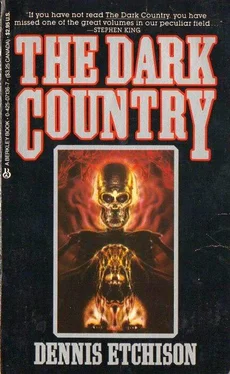Again Martin seemed to have missed something. "Who?"
There was a pause. "I wish I knew the words to describe them."
"I wish you'd try."
"Mm. Let's just see here once. They were dressed in one-piece outfits, what do you call them? Tunics. They had faces that were smooth and just-not-human. They might have been, but they weren't."
"They — they came into your room?'*
"From the walls. They came out of the wardrobe. They'd stand and watch. Waiting. I thought they wanted me to go with them."
Good lord, he thought.
"Couldn't hear. They'd laugh and point at my cast. Mocking, I guess, because I didn't get it. Finally I figured they had to be communicating on some other frequency. As soon as I find it. Tomorrow maybe I'll rig an RF choke to a 100,000 ohm resistor, with a diode instead of a mike coupled direct into the recorder. Jack," he said, leaning forward, with a charged intensity that filled the room with an almost palpable presence. "Jack, they were trying to tell me something. Do you understand me? They managed to leave a part of it on my cast, don't ask me how. Did I tell you that? Look at that one, will you?"
On the screen, the interview was still in progress. Opposite Ashman sat one of the most bizarre-looking beings Martin had ever set eyes on. Out of a reflex curiosity he moved to turn up the volume, when an identifying caption appeared over the face:
MIKEL
Member of Rock Group
"Cycle Sluts"
They continued to watch the silently moving lips.
"He could be one," said the old man. He even chuckled. "As well as anyone, I suppose. Who knows?" Then he said, "Maybe I'm just getting old."
Martin turned his head, trying to see his father's eyes in the dim light.
"I must be. Trying to get through to them. But, you know, sometimes I think it's the only thing that keeps me going.
"She got it in her head to move. I can't fight. She says there'll be 'luxury' out there. Less upkeep. There'll be less to do, all right. I can tell you. I'll knock around inside that trailer like a loose lugnut. Don't even know if I'll be able to keep up with the research out there. Of course, after a while, who knows? Maybe I won't even want to."
His voice took on an incantatory rhythm.
"You know what it'll be like? I'll tell you. It'll be just the same as it was here on sick leave, before the operation. Get up. Can't sleep past dawn, anyway. Putter around. Watch TV. Take a walk. Take a nap. Sit around waiting for dinner. More TV, go to bed. Get up again, try to watch Tom Snyder. Go back to bed. Can't talk to her — never could. I don't know what she wants from me, I swear I don't.
"She sure as hell doesn't want me to move my old radios and the rest of it, I know that. Well, she got her way — but only for the time being. They're going into storage. I'm paying for that with my own money. Until we get the spare room.
"She had some of it packed away before I got home from the hospital. Did you know that?"
They sat side by side, not looking at each other. Crickets started up outside. It grew very late.
"To tell the truth, I haven't tinkered with my old sets for a long time. Since way before the accident. God knows, maybe it'll get to be like that with the research. Maybe I never will hear them, after all. Maybe the ones who say they do are on some kind of trip. Or it's a function of the equipment. I guess I have to admit that. Don't I, Jack." It wasn't a question.
Martin felt words caught in his throat.
"You know why I stopped listening to my old sets?" his father said. "I'll tell you. Because they don't sound as good as they used to. They just don't sound the same at all."
The old man rose and moved slowly across the room, toward the television set and the door to the hall. When he spoke again, the voice sounded far away, getting farther, and very tired.
"I was thinking you could help me, son. The research. No, that's right, you have to go back to your work, your own life tomorrow. I understand. It was good of you to come out and help us pack. The movers are taking care of everything. We won't have to lift a finger. It was good of you, though."
He turned back.
"Why do you suppose that is? The old sets, I mean. Why don't they sound like they used to?"
I know why. It's the programs. They aren't the same as they used to be. They aren't the same programs, he thought, and they aren't as good. But he didn't say it. He didn't say anything. He couldn't.
4 All Screamng, All Bleedng, Ail Dying
A recap of the news came on the all-night channel; at some point the newscast became something called "Creature Features," this week presenting a double bill of Italian or German horror movies of the sleaziest kind, their screaming and bleeding and dying badly dubbed into English and interrupted every seven minutes or so for repetitions of a commercial spot for a recreational vehicle dealership.
Unaccountably, he began to feel that he was being watched. He left the set on.
He passed into the dream as easily as a breath is taken and released. He was aware of the street lamp outside the window, the lights in the last houses along the block finally winking off, the passing and re-passing of cars on the empty street, the easy silence, and the night.
He found himself stranded at the outskirts of an unknown city. He had forgotten what he was doing there, who had left him, when or if it would ever return. From time to time he froze in his tracks, aware of the long umbilical by which he was attached to an electrical outlet, he did not know where. He worked his way through rubble, picking over piles of rags and discard, even though he could no longer remember what it was he was looking for. The sky grew ripe. A panic began to swell in his chest. There was a loosening, a sag and then he felt it slip away and he could not move. Time passed. His kidneys ached with the dull throb of fear. Time was running out. With monumental effort, with the last of the residual energy in his synapses, he strained his fingers to his pockets. He handled crystals, connectors, the myriad spare parts he always carried with him, feeling for the right pieces with which to effect a repair. Then he began to backtrack laboriously along the cord, searching for an alternate power source. He would jerrybuild a tap and go on. He had no choice. It was his life. His movements were jerky, painfully slow, a metal man in search of an oilcan. He would have to splice in an extra-long, heavy-duty extension that would not fail him again. But time ran out; time stopped, and it was too late for anything: too late for help, for divine intervention or for surcease of any kind, ever.
Martin snapped the television off and sat staring as the image disappeared in a thick, murky cloud of color.
5 It Will & Here Soon
"It will be here soon," said the mother. "What will?"
"The moving truck, what else? Won't that be nice?"
Martin sat at the table, picking at his breakfast. With his left hand he leafed through the class reunion program. Through the window, he saw the gaunt figure of his father; he had finished his morning walk and was now fooling with some of the cartons from the garage. A few boxes were still inside, next to the kitchen door; these, Martin knew, would be the last to go. The tools of his research.
The mother finished wrapping the last of her dishes in newspaper. She had grown cheerfully plump, he noticed, and, perhaps for the first time since his dad had married her, she was humming to herself under her breath. "He talked to you last night," she said.
"Yes."
He went on thumbing through the book. He came upon a page listing several people he thought he had known once. Each had been allotted a paragraph summary of the last fifteen years. He recognized the name of a boy who had been his best friend.
Читать дальше











